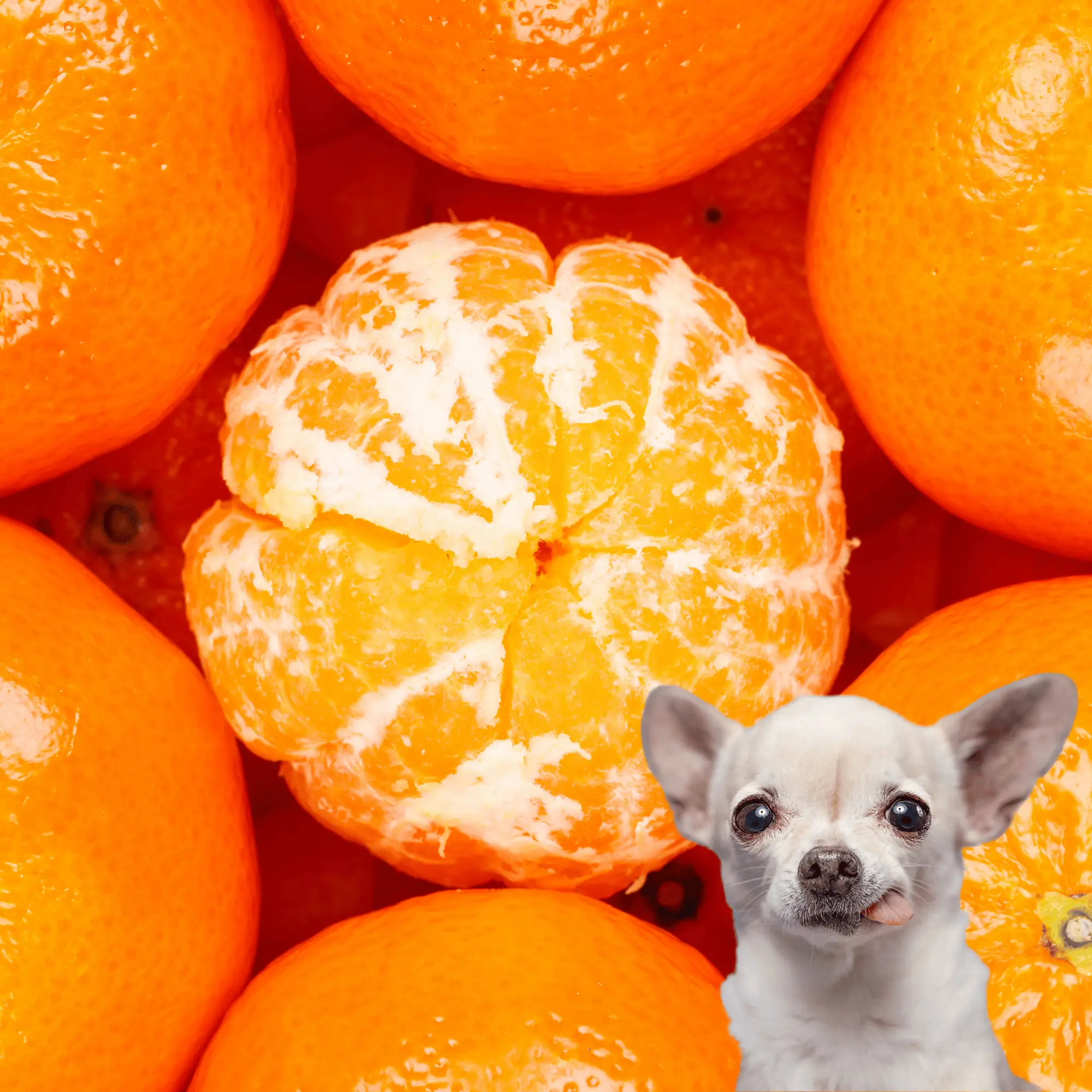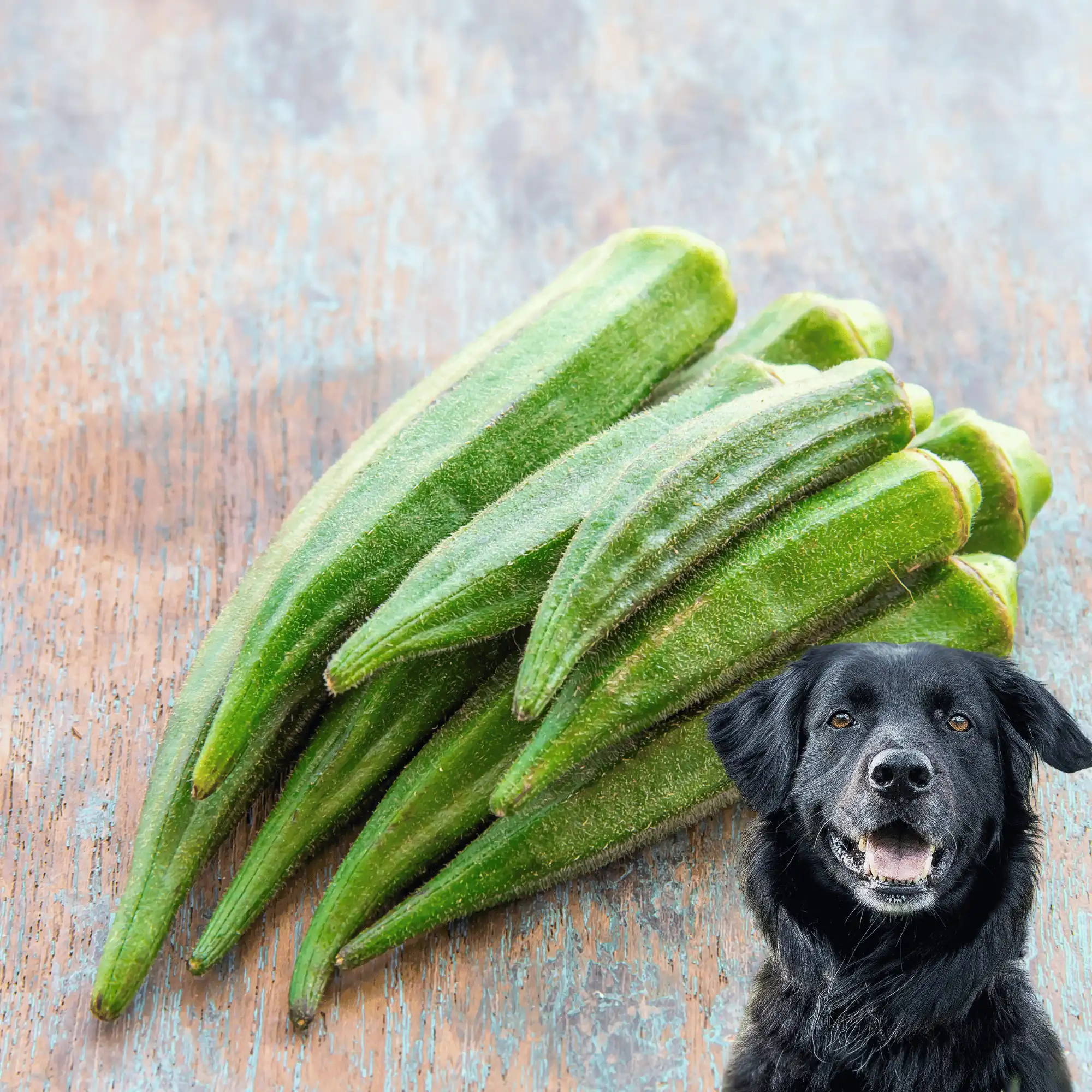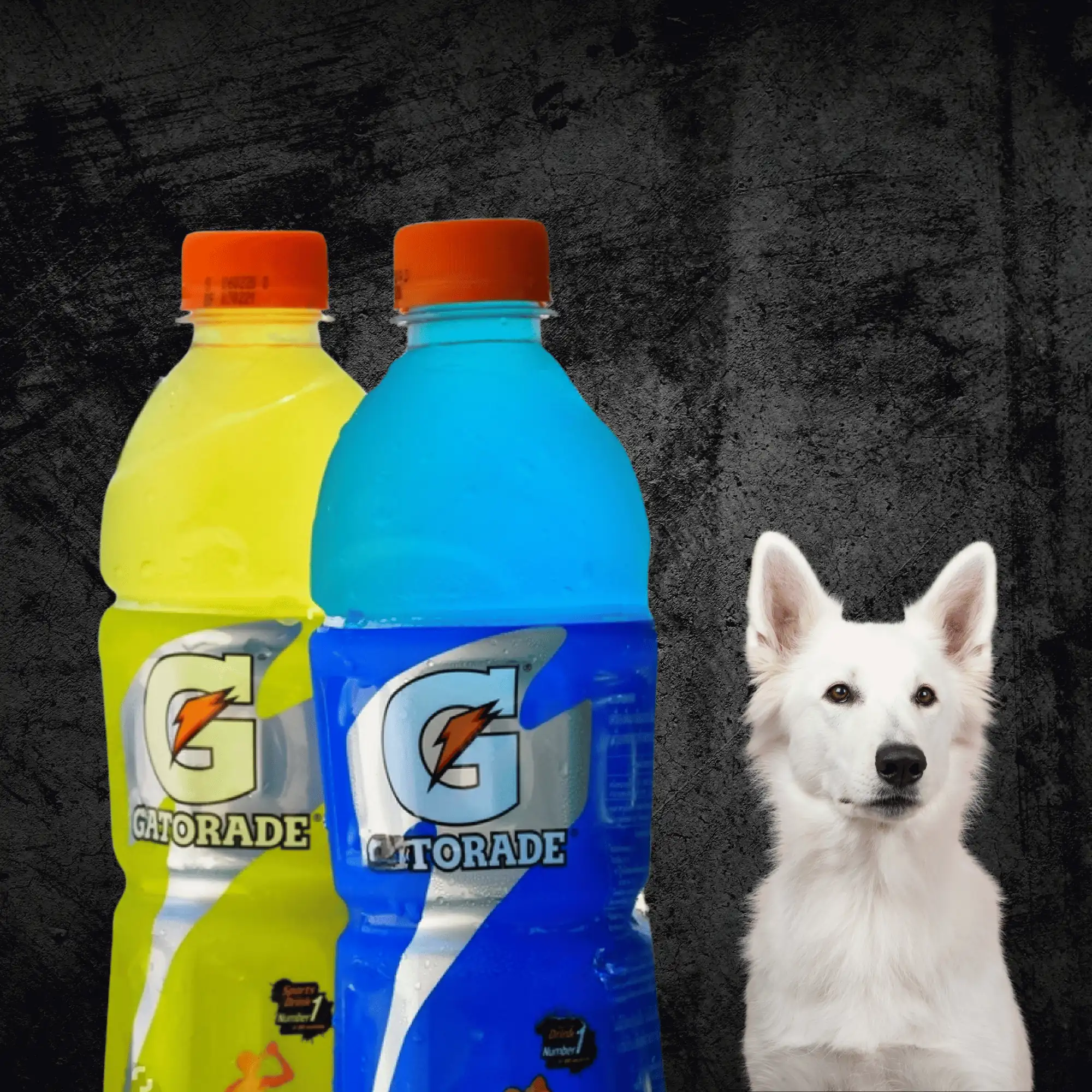Mandarins are a sweet and popular citrus fruit that many people love to eat as a healthy snack. Their bright color and refreshing taste make them a favorite. But when it comes to sharing this treat with our dogs, many pet owners wonder, “Can dogs eat mandarins?” Before offering your dog a slice of this juicy fruit, it’s crucial to determine if it’s safe for them to eat. Dogs have different dietary needs than humans, and not all human foods are good for them.
This guide will explain the safety of feeding mandarins to dogs, including the benefits and potential risks. We’ll cover the nutritional value of mandarins, how they can be good for your dog, and what to watch out for to keep your pet safe. By the end of this guide, you’ll know whether mandarins can be a healthy part of your dog’s diet.
Here are the topics we’re following in this article:
- What are Mandarins?
- Can Dogs Eat Mandarins?
- The Nutritional Value of Mandarins
- Are Mandarins Good for Your Furry Friends?
- Are Mandarins Bad for Your Dogs?
- Can Puppies Eat Oranges?
- How Many Oranges Can Dogs Safely Eat?
- How to Safely Introduce Mandarins to Dogs?
- Alternative Fruits Dogs Can Eat
What are Mandarins?
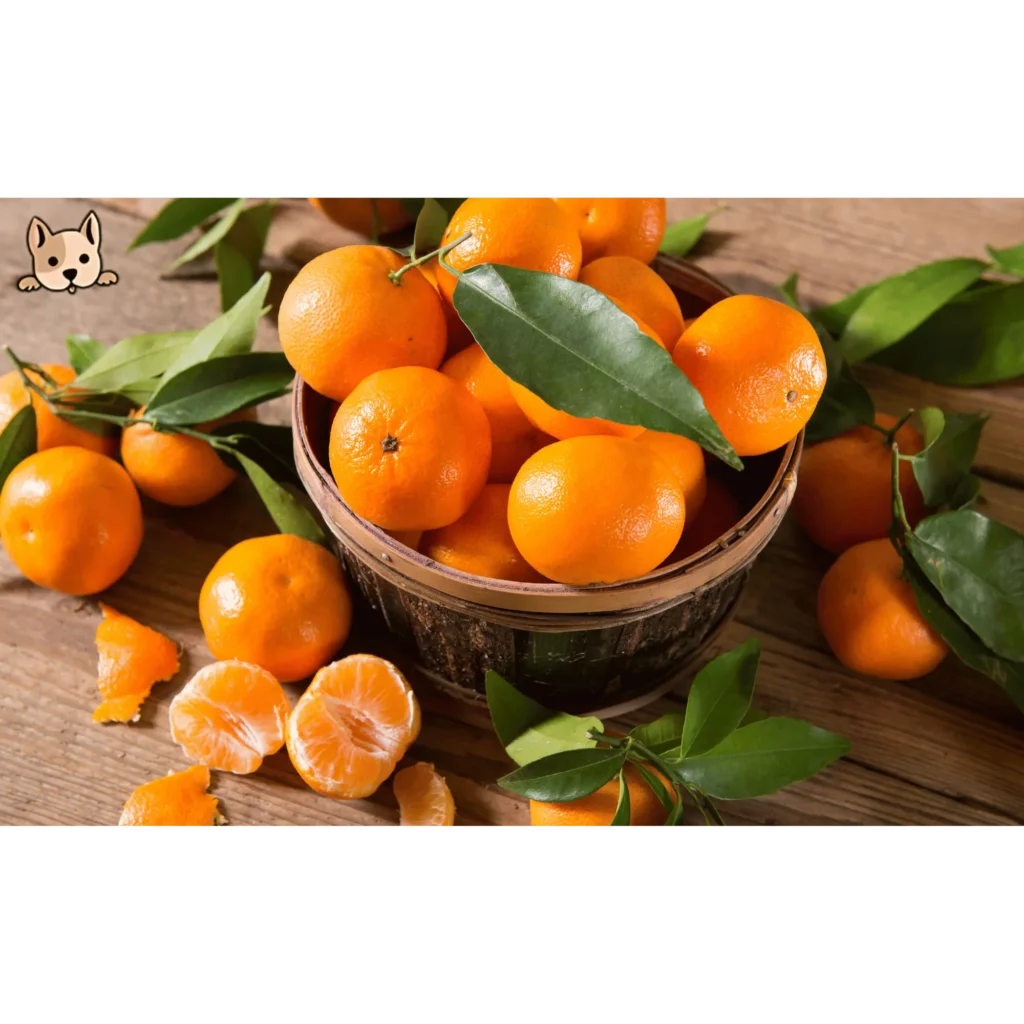
Mandarins are small, easy-to-peel oranges known for their sweetness and high vitamin C content. They are part of the citrus fruit family, which includes oranges, lemons, limes, and grapefruit. They are smaller, sweeter, and simpler to peel compared to regular oranges. Tangerines, a specific type of mandarin, are distinguished by their deep reddish-orange color and slightly textured skin.
Can Dogs Eat Mandarins?
Yes, dogs can eat mandarins in moderation. They are generally safe for dogs, but it’s important to feed them without the seeds or peel. The fruit itself isn’t toxic, but its natural sugars and acidity can upset your dog’s stomach if given in large amounts. Introduce mandarins gradually and watch for any signs of digestive issues. While an occasional mandarin segment as a treat is safe, there are tastier options your dog might prefer.
The Nutritional Value of Mandarins:
Mandarins are a nutritious fruit with several beneficial nutrients. Here’s an overview of their nutritional value per 100 grams:
- Calories: Approximately 53 kcal
- Carbohydrates: Around 13.3 grams
- Sugars: About 10.6 grams
- Fiber: Roughly 1.8 grams
- Vitamins:
- Vitamin C: High content, providing about 26% of the recommended daily intake (RDI)
- Vitamin A: Provides some beta-carotene, which is important for eye health
- Vitamin B6, Vitamin E, and Vitamin K: Present in smaller amounts
- Minerals:
- Potassium: Significant, supporting heart health and muscle function
- Calcium, Magnesium, and Phosphorus: Found in trace amounts
Mandarins are low in calories and fat, making them a healthy snack option. They are particularly known for their high vitamin C content, which supports immune function and skin health. Furthermore, its fiber content contributes to overall digestive health. However, as with any food, moderation is key to avoiding overloading natural sugars and acidity, especially for dogs or individuals with specific dietary concerns.
Are Mandarins Good for Your Furry Friends?
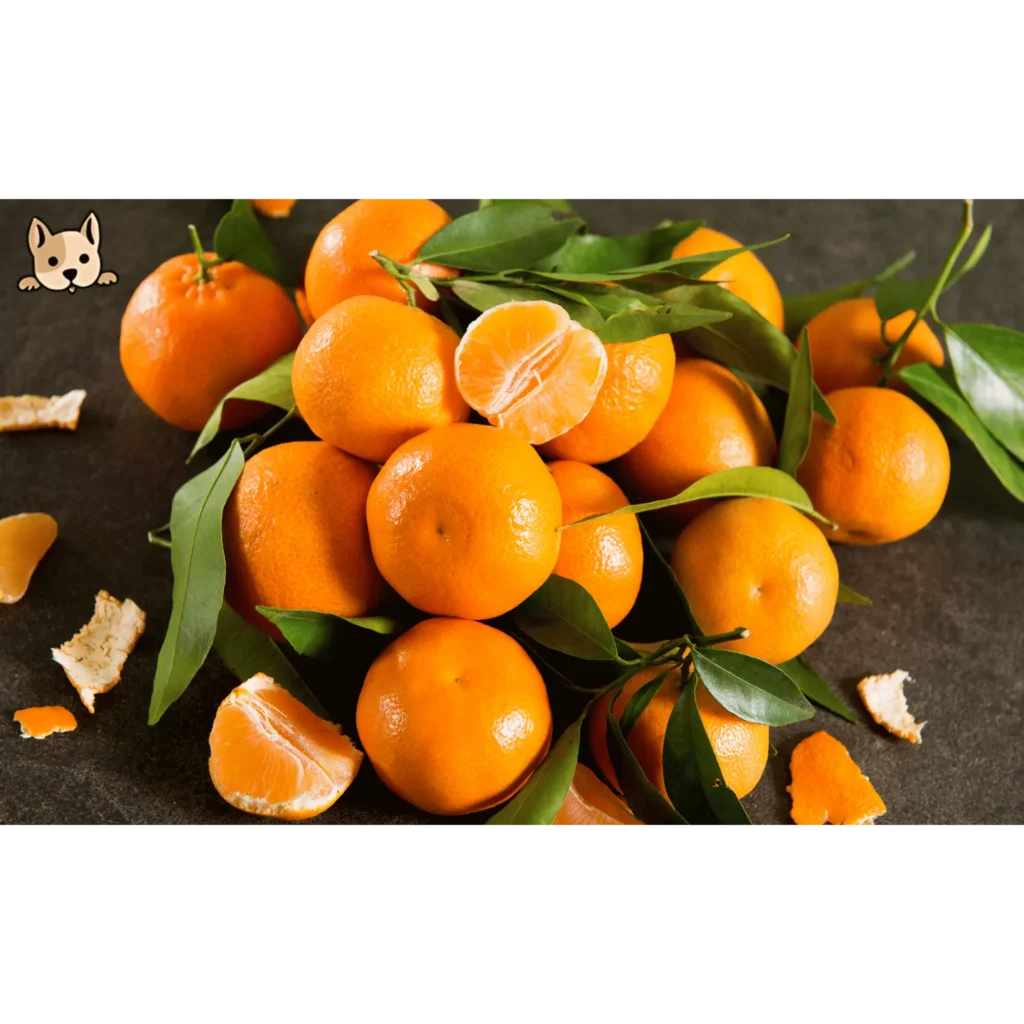
Mandarins can generally be considered safe for dogs when given in moderation. It’s important to introduce them gradually into your dog’s diet and observe for any negative reactions. While a small amount of mandarin is unlikely to cause harm, consuming large quantities may lead to digestive issues such as diarrhea, vomiting, or stomach discomfort.
If your dog has existing health conditions or is on medication, it’s advisable to consult your veterinarian before including mandarins in their diet. This precaution ensures that the fruit won’t interfere with their specific health needs or medications.
Furthermore, it’s crucial to avoid feeding mandarin peels to dogs. The peel and pith contain essential oils like limonene and linalool, which are difficult for a dog’s digestive system to break down. Ingestion of these oils can result in gastrointestinal upset, potentially causing symptoms like vomiting and diarrhea. Therefore, always discard the peel before offering mandarin segments to your pet.
Are Mandarins Bad for Your Furry Friends?

Mandarins can potentially be bad for some dogs, primarily due to their natural sugars and acidity, which can cause digestive upset in sensitive individuals. Here are some considerations:
1. Digestive Issues:
Mandarins contain natural sugars, primarily in the form of fructose. While these sugars are generally safe in small amounts, consuming too much can lead to gastrointestinal upset in dogs.
Symptoms may include diarrhea, vomiting, or stomach discomfort. Dogs with sensitive stomachs or those who are prone to digestive issues may be more susceptible to these effects.
2. Allergies or Sensitivities:
Citrus fruits, like mandarins, can trigger allergic reactions in some dogs. Symptoms of an allergic reaction may include itching, swelling (especially around the face or ears), redness of the skin, or digestive disturbances.
If your dog shows any signs of allergies after consuming mandarins, it’s best to avoid giving them citrus fruits in the future and consult with your veterinarian.
3. Seeds and Peel:
The seeds and peel of mandarins can be problematic for dogs if ingested. The seeds can pose a choking hazard or cause gastrointestinal blockages.
The peel, while not toxic, can be difficult for dogs to digest and may lead to stomach irritation or discomfort. Always remove the seeds and peels before offering mandarins to your dog.
4. Health Conditions:
Dogs with certain health conditions should avoid fruits like mandarins due to their sugar content. For example:
- Diabetes: The sugars in mandarins can cause spikes in blood sugar levels, which is problematic for dogs with diabetes. It’s crucial to monitor and control their carbohydrate intake carefully.
- Pancreatitis: This condition involves inflammation of the pancreas, which high-fat and high-sugar foods can exacerbate. Citrus fruits, like mandarins, may trigger pancreatitis flare-ups in susceptible dogs.
5. Moderation:
Even for healthy dogs without specific health concerns, mandarins should be given in moderation as an occasional treat.
Too much fruit in a dog’s diet can upset the nutritional balance, contribute to excessive calorie intake, and potentially lead to weight gain or other health issues over time.
While mandarins can be a treat for some dogs in moderation, it’s crucial to consider potential risks and prioritize your dog’s specific health needs before adding them to their diet.
Can Puppies Have Oranges?
Yes, puppies can eat oranges, but they are more likely to experience gastrointestinal upset compared to adult dogs. It’s best to offer your puppy only a very small amount of orange. Just like with adult dogs, make sure to remove the peel and seeds before giving it to them. This reduces the risk of digestive issues and ensures their safety while enjoying the fruit.
How Many Oranges Can Dogs Safely Eat?
The size and breed of your dog can impact how well they digest oranges. Larger breeds like Huskies or German Shepherds may handle two or three orange segments without issue, whereas smaller breeds such as Yorkies or Pomeranians might experience stomach upset with the same amount.
Additionally, the calorie and sugar content of oranges can be significant for smaller dogs compared to larger ones. Treats, including fruits like oranges, should never exceed 10% of your dog’s daily calorie intake. It’s essential to adjust their meal portions accordingly to maintain a balanced diet.
Here is a table for some general feeding guidelines based on your dog’s weight and size:
| Dog Size | Recommended Portion of Orange Segment |
| Extra-small dog (2–20 lbs) | ½ orange segment |
| Small dog (21–30 lbs) | ½ orange segment |
| Medium dog (31–50 lbs) | 1 orange segment |
| Large dog (50–90 lbs) | 1 to 2 orange segments |
| Extra-large dog (91+ lbs.) | 2 orange segments |
How to Safely Introduce Mandarins to Dogs?
If you decide to give mandarins to your dog, it’s important to take proper precautions to ensure their safety. First and foremost, remove the peel before feeding mandarins to your dog. The essential oils in mandarin peels can potentially cause stomach upset in dogs, so it’s best to eliminate this risk by peeling the fruit beforehand.
Additionally, be sure to remove all seeds from the mandarins. Like many fruits, mandarins contain seeds that can be a choking hazard for dogs. Thoroughly check each segment and remove any seeds before offering the fruit to your pet.
Cut the mandarin into small, manageable pieces to further reduce the risk of choking and aid digestion. This helps prevent choking and makes it easier for your dog to chew and digest the fruit.
Remember, moderation is key when feeding mandarins to your dog. While they are generally safe in small amounts, mandarins are high in sugar. Too much sugar can potentially lead to digestive issues or weight gain in dogs. Therefore, it’s advisable to offer mandarins as an occasional treat rather than a regular part of their diet.
By following these guidelines—removing the peel and seeds, cutting into small pieces, and feeding in moderation—you can safely share mandarins with your dog as a healthy and enjoyable treat. Always monitor your dog for any signs of discomfort or allergic reactions after feeding them new foods, and consult your veterinarian if you have any concerns about their diet or health.
Alternative Fruits Dogs Can Eat:

Aside from mandarins, several fruits are safe and healthy for dogs. When giving these fruits to your dog, be sure to remove any seeds, cores, or rinds, and offer them in moderation to prevent any potential harm to your furry friend. Here are some fruits that can be good snacks for your dog:
- Apples: Apples are low in fat and high in fiber, containing vitamins A and C, which are beneficial for your dog’s health. Before serving, ensure you remove the seeds and core.
- Bananas: Bananas are rich in fiber, potassium and vitamins B6 and C. They are low in fat and cholesterol but high in sugar, so give them sparingly.
- Blueberries: Packed with antioxidants, fiber, vitamins C and K, and manganese, blueberries can boost your dog’s immune system and serve as a low-calorie snack or training treat.
- Pineapple: Pineapple is sweet and rich in vitamin C and bromelain, aiding digestion. It’s high in sugar, so offer it in small amounts.
- Strawberries: Another source of antioxidants, fiber, and vitamin C, strawberries are a nutritious snack. Like bananas and pineapple, they should be given in moderation due to their sugar content.
- Watermelon: Refreshing and hydrating, watermelon is low in calories and high in vitamins A, B6, and C, as well as lycopene. Remove seeds and rind before serving.
- Mango: Mangoes are tropical fruits packed with vitamins A, C, and E, fiber, and antioxidants. They’re high in sugar, so offer them sparingly to your dog.
These fruits can provide variety and nutritional benefits to your dog’s diet when given responsibly. Always monitor your dog for any adverse reactions, and consult with your veterinarian if you have concerns about incorporating new foods into their diet.
Conclusion:
In conclusion, while mandarins can be a safe and enjoyable occasional treat for dogs, it’s crucial to approach their inclusion in your pet’s diet with caution. Mandarins offer nutritional benefits such as vitamins C and A, but their high sugar content and potential digestive issues mean they should be fed in moderation. Always remove the peel and seeds before giving mandarins to your dog to prevent any gastrointestinal upset or choking hazards.
Additionally, consider alternative fruits like apples, bananas, and blueberries, which provide similar health benefits without the risks associated with citrus fruits. Ultimately, monitoring your dog’s reaction and consulting with your veterinarian are essential steps to ensuring a balanced and healthy diet for your furry companion.
FAQs:
Are mandarins toxic to dogs?
While mandarins are not toxic to dogs, they should not be a regular part of their diet. Most dogs can eat mandarins without serious health issues, but they might experience digestive discomfort, like an upset stomach. It’s best to offer mandarins as an occasional treat rather than a daily snack for your dog’s well-being.
Can dogs eat oranges and tangerines?
Yes, dogs can safely eat oranges and tangerines in moderation. These citrus fruits are not toxic to dogs and can provide nutritional benefits when given appropriately.
Can dogs have orange peels?
Always remove the orange peel and seeds before giving your dog orange slices. The peel is hard to digest and could cause intestinal blockage. The oils in the peel can also lead to severe gastrointestinal upset, resulting in vomiting, diarrhea, and potentially dehydration.
Can dogs drink orange juice?
Orange juice isn’t toxic to dogs, but it’s not a good treat choice. It’s high in sugar and very acidic, which might upset your dog’s stomach.






